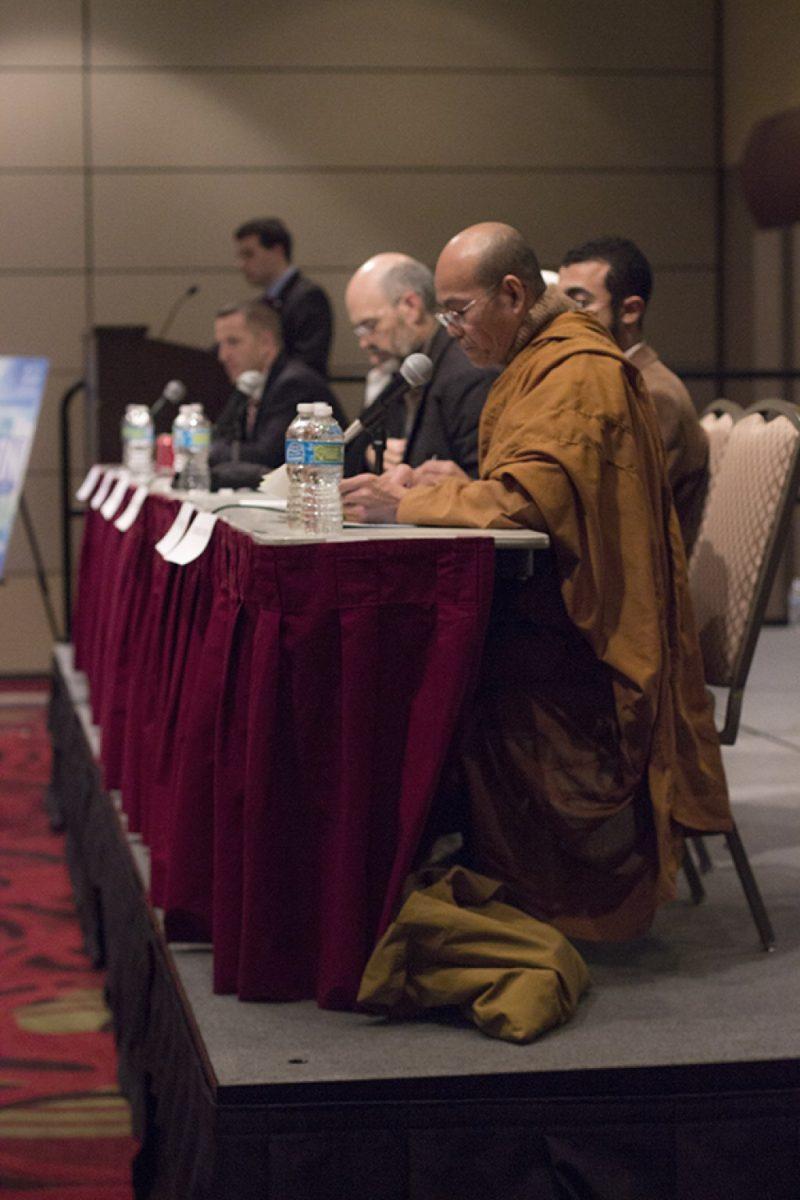Religious leaders from across the state gathered in the MSC Wednesday night to discuss topics of importance that pertain to their beliefs.
The panel addressed individual backgrounds of each panelist along with common misconceptions people have about their respective religions, the roles of women and the effect of religion on society.
Ansel Berber-Thayer, ocean engineering senior and the vice president of Gents of Texas A&M, which hosted the event, said the Gents’ goal was to allow the panelists to expose their faiths and doctrines thoughtfully and with understanding.
“Some of the questions from the audience that were very pointed, I think the idea of the short history of religion relative to the extensive history of the world, and humanity, was a very good point to bring up,” Berber-Thayer said.
The panel consisted of one representative per religion — Islam, Buddhism, The Church of Jesus Christ of Latter Day Saints, Judaism, Agnosticism and Christianity.
Nate Sharp, associate professor of accounting at the Mays Business School and the panelist representing the Church of Jesus Christ of Latter Day Saints, discussed how he felt his beliefs aligned with those of David Hardage, the executive director of the Baptist General Convention of Texas, and said the Mormon church is, fundamentally, a Christian church.
“We believe in the Bible as the word of God, we accept the Old and New Testament as the word of God, we believe in Jesus Christ as the Son of God, that He is the Savior of mankind, and that only through Jesus Christ can we receive eternal salvation,” Sharp said.
Like Sharp, Hardage said he connected with his religion at a young age and believes that Baptism stems from three main categories — its background, the belief in Christ and how the two holidays, Easter and Christmas, are celebrated.
“I did grow up in a Christian home,” Hardage said. “As a matter of fact, my father was a Baptist minister for 62 years. So it would be accurate for me to say that my personal faith was influenced by my parents, but it would go too far to say that it was determined by my parents.”
Venerable Katapunna, the resident monk of the American Bodhi Center answered the prompt of women and their role within a religious construct.
Katapunna said Buddha gave women full freedom to participate in Buddhism and to prove themselves to hold the same capacity as men.
“There was a story about an Indian king, and he was so very disappointed when a daughter was born to him,” Katapunna said. “So the Buddha consoled him, saying that a female child may prove to be a better offspring than a male, for she may grow as wise and virtuous.”
Ahmed Morsy, the Islam representative, said women were given the same sets of rights present day from the the time mankind was created. He said women have the same religious duties and responsibilities as men, as well as financial rights and the right for employment.
Louis Tassinary, the Agnosticism panelist representative and professor of visualization, said he believed that atheists’ or agnostics’ cultural identity was overdeveloped. Tassinary said he believed that the contributions of Agnosticism or Atheism include embracing critical thinking, self doubt and humility.
The Judaism population only counts for .2 percent of the world’s population, said Rabbi Matt Rosenberg, executive director at Texas A&M Hillel, but Jewish productivity extends beyond their demographic. He said Jews have earned 22 percent of the world’s Nobel Prizes, and that most of the Christian values come from the Hebrew Bible.
“We are, of course, the source religion for both Islam and Christianity, and so most of the world’s population has us to thank,” Rosenberg said when he spoke of Judaism’s contributions to Western civilization.
Religious panel prompts faith, theological discussion
November 20, 2014
Venerable Katapunna, the resident monk of the American Bodhi Center answered the prompt of women and their role within a religious construct.
Photo by: Allison Bradshaw
0
Donate to The Battalion
$2790
$5000
Contributed
Our Goal
Your donation will support the student journalists of Texas A&M University - College Station. Your contribution will allow us to purchase equipment and cover our annual website hosting costs, in addition to paying freelance staffers for their work, travel costs for coverage and more!
More to Discover










